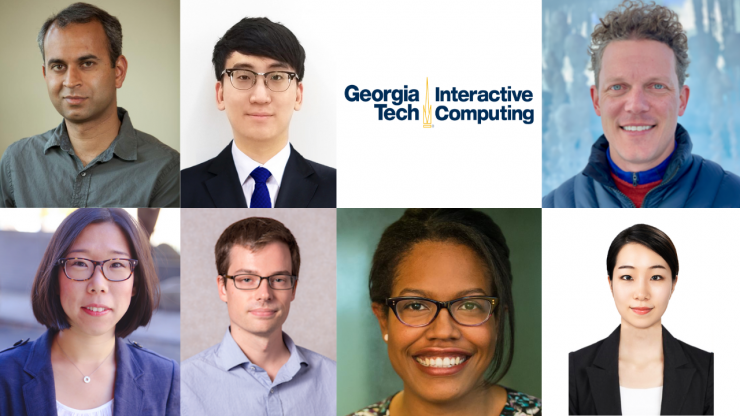Welcome New IC Faculty: Seven Join School from Variety of Research Areas
Sep 02, 2020 — Atlanta, GA

Each year, the School of Interactive Computing conducts a rigorous search for the brightest minds to carry forward its academic and research initiatives. This year, IC welcomes seven to that mission. Take a quick glance at the new research coming to the School in 2020.
Sehoon Ha
Ph.D. in Computer Science, Georgia Tech 2015
Research interests: Robotics, Artificial Intelligence, Character Animation
Ha’s research lies at the intersection of computer graphics and robotics, including physics-based animation, deep reinforcement learning, and computational robot design. Specifically, he has published work that addresses the need for more intelligent control software in robotics to improve agility, robustness, efficiency, and safety. In the long term, he aims to develop robotic companions for the home, search-and-rescue robots for disaster recovery scenes, and custom medical surgery robots that are tailored to individual patients.
Jennifer Kim
Ph.D. in Computer Science, University of Illinois, Urbana-Champaign 2019
Research interests: Human-Computer Interaction, Interactive Systems, Health Care
Kim’s research investigates and develops interactive systems as communication artifacts to address various health-related challenges such as financial burdens of medical costs, difficulties in understanding behaviors of people with neurological disorders, and online health misinformation.
Chris Le Dantec
Ph.D. in Human-Centered Computing, Georgia Tech 2011
Research interests: Digital Media, Science and Technology Studies
Le Dantec is interested in developing community-based design practices that support new forms of collective action through production and use of civic data. Specifically, his research has direct impact on how policy makers and citizens work together to address issues of community engagement, social justice, urban transportation, and development.
Andrea Grimes Parker
Ph.D. in Human-Centered Computing, Georgia Tech 2011
Research interests: Human-Computer Interaction, Computer Supported Cooperative Work, Health Informatics
Grimes Parker designs and evaluates the impact of software tools that help people manage their health and wellness with a particular focus on equity. She studies racial, ethnic and economic health disparities, and the social context of health management. Through technology design, her research examines intrapersonal, social, cultural, and environmental factors that influence a person’s ability and desire to make healthy decisions.
Alan Ritter
Ph.D. in Computer Science and Engineering, University of Washington 2013
Research interests: Natural Language Processing, Information Extraction, Machine Learning
Ritter’s research aims to solve challenging technical problems that can help machines learn to read vast quantities of text with minimal supervision. Past work included a system that reads millions of tweets for mentions of new software vulnerabilities. This tool spotted critical security flaws in software. He is also interested in data-driven dialogue agents that can converse with people more naturally.
Sashank Varma
Ph.D. in Cognitive Studies, Vanderbilt University 2006
Research interests: Abstract Mathematical Thinking, Memory Systems Supporting Language Processing, Computational Models of High-Level Cognition
Varma’s research investigates complex forms of cognition that are uniquely human from multiple disciplinary perspectives. Primarily, this involves mathematical cognition, where he investigates how people use symbols systems to understand abstract mathematical concepts, how they develop intuitions about and insights into mathematics, and the mental mechanisms shared between reasoning and algorithmic thinking.
Wei Xu
Ph.D. in Computer Science, New York University 2014
Research Interests: Natural Language Processing, Machine Learning, Social Media
Xu’s recent work focuses on methods to understand the varied expressions in human language and to generate paraphrases for applications, such as reading and writing assistive technology. She has also worked on crowdsourcing, summarization, and information extraction for user-generated data, such as Twitter and StackOverflow.




